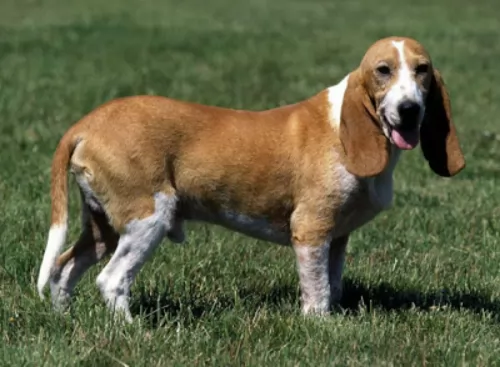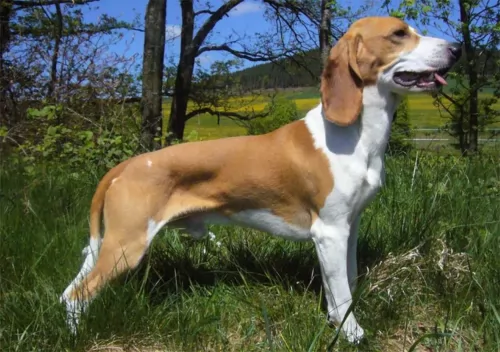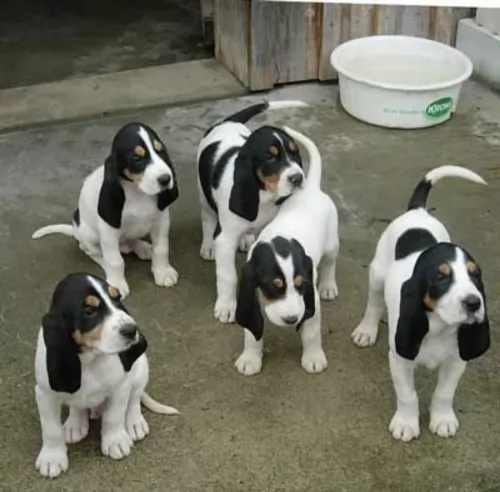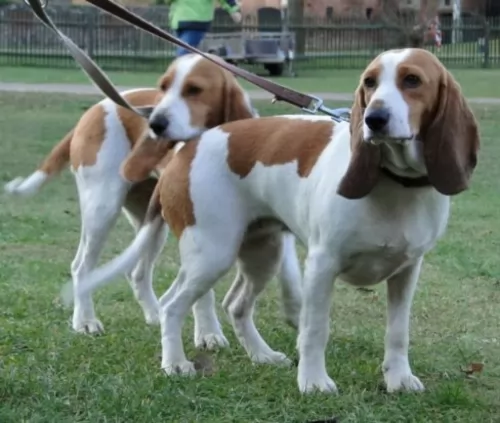 Petzlover
Petzlover English Foxhound is originated from United Kingdom but Schweizer Niederlaufhund is originated from Switzerland. English Foxhound may grow 21 cm / 9 inches higher than Schweizer Niederlaufhund. English Foxhound may weigh 17 kg / 38 pounds more than Schweizer Niederlaufhund. English Foxhound may live 3 years less than Schweizer Niederlaufhund. Both English Foxhound and Schweizer Niederlaufhund has same litter size. Both English Foxhound and Schweizer Niederlaufhund requires Low Maintenance.
English Foxhound is originated from United Kingdom but Schweizer Niederlaufhund is originated from Switzerland. English Foxhound may grow 21 cm / 9 inches higher than Schweizer Niederlaufhund. English Foxhound may weigh 17 kg / 38 pounds more than Schweizer Niederlaufhund. English Foxhound may live 3 years less than Schweizer Niederlaufhund. Both English Foxhound and Schweizer Niederlaufhund has same litter size. Both English Foxhound and Schweizer Niederlaufhund requires Low Maintenance.
 The English Foxhound was found in Great Britain as far back as the late 1700’s. They were bred to be scent hounds and hunt the fox by following his smell. It was a crossing of several different types of hounds that produced the English Foxhound. This included the Greyhound, the Bulldog and the Fox Terrier. It was perceived that there were not a lot of deer left in the United Kingdom to be hunted for both sport and food. So, a new dog would be needed instead for the Staghound and Deerhound.
The English Foxhound was found in Great Britain as far back as the late 1700’s. They were bred to be scent hounds and hunt the fox by following his smell. It was a crossing of several different types of hounds that produced the English Foxhound. This included the Greyhound, the Bulldog and the Fox Terrier. It was perceived that there were not a lot of deer left in the United Kingdom to be hunted for both sport and food. So, a new dog would be needed instead for the Staghound and Deerhound.
The Foxhound was developed as a pack animal bred to chase the fox followed by hunters on horses. The Foxhound was bred with incredible stamina, a great ability to follow scents, track prey, and act as a watchdog as well. This breed are pack animals. They hunt in packs and prefer to live in packs. A solitary English Foxhound is probably not a happy Foxhound. The English Foxhound is stockier and slower than his cousin the American Foxhound. The English Foxhound is recognized by the AKC and UKC. In 2012 the International Foxhound Association was developed to promote the English Foxhound.
 Originating in Switzerland, the Schweizer Niederlaufhund was established around 1900, when hunting became restricted to districts. The Swiss hunter needed a slower dog for the limited territory they could hunt in. Crossing selected Schweizer Laufhunds with Basset Hounds and other selected smaller, short legged hounds developed the Schweizer Niederlaufhund. By 1905 there was already a Schweizer Niederlaufhund Club.
Originating in Switzerland, the Schweizer Niederlaufhund was established around 1900, when hunting became restricted to districts. The Swiss hunter needed a slower dog for the limited territory they could hunt in. Crossing selected Schweizer Laufhunds with Basset Hounds and other selected smaller, short legged hounds developed the Schweizer Niederlaufhund. By 1905 there was already a Schweizer Niederlaufhund Club.
The Niederlaufhund became one of the best hunting dogs in the world, with its powerful body and ability to outhunt the Laufhund in tracking big game. Slower of course than the Laufhund it has a great sense of smell and an ability to easily find wounded animals. There are a few varieties, just like with the Swiss Hound again mostly because of their coloring. The Luzerner Niederlaufhund, the Jura Neiderlaufhund, and the Schwyzerlaufhund. They have musical voices that they use to communicate with the hunters and each other as well as that amazing sense of smell. They can hunt for hours without tiring and without much information from the hunter.
They are a cross breed not recognized by the larger kennel club such as the AKC and the UKC. They are recognized by the Dog Registry of America, Inc. (DRA), the American Canine Association Inc. (ACA) and most importantly by the Federation Cynologique Internationale (FCI). This last one is important because it could lead to recognition as a new breed by the UKC and the AKC.
 The English Foxhound is a superb athlete who can run for hours without a break. He has muscular, sturdy and straight legs with round paws. His chest is deep, and his back is level. Their head is wide, and the muzzle is long with 16 inches in the front of the ears. The nose is long, and those ears are set low. They can be many colors as long as it is a “hound” color of tan, tricolor, black and white, or red.
The English Foxhound is a superb athlete who can run for hours without a break. He has muscular, sturdy and straight legs with round paws. His chest is deep, and his back is level. Their head is wide, and the muzzle is long with 16 inches in the front of the ears. The nose is long, and those ears are set low. They can be many colors as long as it is a “hound” color of tan, tricolor, black and white, or red.
 The Schweizer Niederlaufhund is a medium size, short dog. They look like their cousins, the Schweizer Laufhund but smaller. Their body is just slightly longer than it is tall, so you are left with the impression of a mostly square dog. The Niederlaufhund is well put together, with strong legs, a noble head, long droopy ears, broad chest, and a low held tail.
The Schweizer Niederlaufhund is a medium size, short dog. They look like their cousins, the Schweizer Laufhund but smaller. Their body is just slightly longer than it is tall, so you are left with the impression of a mostly square dog. The Niederlaufhund is well put together, with strong legs, a noble head, long droopy ears, broad chest, and a low held tail.
The Small Lucerne Hound has a white cote with smooth speckles of black or gray making them appear to be blue.
The Small Bernese Hound has a tricolor coat of white, tan and black. There are tan marks on the eyebrows. There is a wire haired Small Bernese as well. He has a short beard.
The Small Schwyz Hound is smooth coated in white with orange or yellow-red patches. The wired haired version is extinct.
The Small Jura Hound is a single coated dog with a black coat and tan marking above his eyes as eyebrows as well. He might have some white as well.
 The English Foxhound gets along with other dogs and like people. He was bred to be a pack animal, not a loner. He will get along with most any other animal and children as well. However, they are not often kept as pets because their prey drive and pursuit drive are so strong that nothing else matters. The chase is what life is all about for this breed. They are hardwired for it. They are not easy to train because they are constantly distracted by smells and movements that could send them off on the chase.
The English Foxhound gets along with other dogs and like people. He was bred to be a pack animal, not a loner. He will get along with most any other animal and children as well. However, they are not often kept as pets because their prey drive and pursuit drive are so strong that nothing else matters. The chase is what life is all about for this breed. They are hardwired for it. They are not easy to train because they are constantly distracted by smells and movements that could send them off on the chase.
Keep them on a lease when walking them so they don’t go wandering or running of. They love to run, and they love to talk – bay actually. They might slow down somewhere around 8-10 years old. They need a strong owner and a lot of exercise to be happy.
 Children friendliness – yes, they are but use caution around small children and small prey.
Children friendliness – yes, they are but use caution around small children and small prey.
3. Adaptability - needs room to run and explore – is very frustrated when confined.
 The Niederlaufhund Is prone to a very medical issues to keep an eye on. They include:
The Niederlaufhund Is prone to a very medical issues to keep an eye on. They include:
• Hip Dysplasia – This comes from hip joints that are not well formed and cause reduced mobility and pain. Parents can be tested before the dogs are bred to make sure their hips are good, and that dysplasia will not be passed to puppies. This dysplasia can cause arthritis and even lameness.
• Ear Infections – With long drooping ears it is easy for the dog to acquire ear infections. This is even more so for a hunting dog like the Niederlafhund. It is important to clean the dog’s ears on a regular basis.
 The English Foxhound is a high energy dog that needs a high quality dog food. He should be fed about 2.5 -3 cups a day in two meals of dry food. Because he is a deep chested dog, beware of bloat and don’t feed large meals, particularly before or after strenuous exercise.
The English Foxhound is a high energy dog that needs a high quality dog food. He should be fed about 2.5 -3 cups a day in two meals of dry food. Because he is a deep chested dog, beware of bloat and don’t feed large meals, particularly before or after strenuous exercise.
Seizures are caused by epilepsy, but they can be treated, and the dog can have a quality life.
When the stomach becomes distended or twisted. Can result in death if not treated immediately.
The English Foxhound’s long, floppy ears are prone to infection and allergies. Inspect and clean them regularly.
The English Foxhound is an easygoing canine, but he has an incredible energy level and needs a lot of exercise every day. In fact, if you are not going to hunt then don’t get a Foxhound. It is not fair to the dog. Of course, if you have acres of land and are into agility, tracking, coursing and rally then this might be the dog for you. But if the English Foxhound does not get enough daily exercise, he will not be a good house pet. This dog was bred to run for miles. You cant keep him cooped up in your house.
 1Feeding the puppy - give 1 cup per day of high quality dog food divided into 3 meals.
1Feeding the puppy - give 1 cup per day of high quality dog food divided into 3 meals.
2.Feeding the adult – give one and one half cups of high quality dog food divided into 2 meals.
4. Games and Exercises – needs a lot of daily exercise and loves field trials, running and activities like barn hunt.